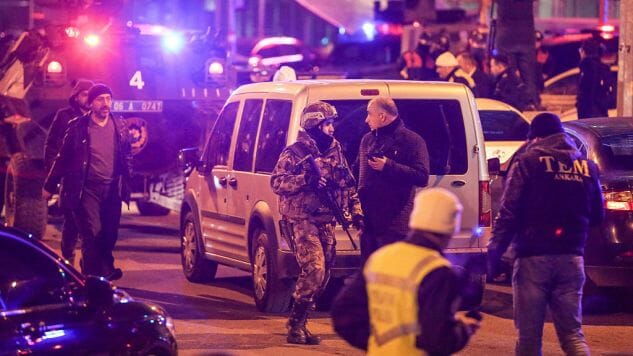A Russian ambassador was assassinated in Turkey today. Nobody knows what happens next.
Audrey G. Karlov was shot from behind by a single gunman, allegedly an off-duty Turkish policeman, Mevlut Altintas. Three other persons were apparently injured during the man’s attack. The entire event was recorded on video.
The surroundings—a gallery in Ankara, the Turkish capital—only added to the unreal atmosphere of the crime. The first pictures of the gunman, his victim, and the terrified onlookers looked very much like a performance piece, or the cover of a thriller novel. The head photos in the New York Times showed the suit-clad shooter standing on a polished white floor in a room with walls the color of bleached bone, his victim’s body sprawled out on the ground like a child making a snow angel.
The public event that provided a stage for the execution strangely echoed the crime. Karlov was struck down while giving a speech. He was opening an art exhibition which featured Turkish paintings about Russia. “Russia Through Turks’ Eyes” was the title. The exhibition was an education, all right. The world learned exactly what one pair of Turkish eyes sees when it looks at Russia.
In one sense, like any political assassination, this was political theater of the most obscene kind. The gunman had scripted lines he shouted after the attack. Tim Arango and Rick Gladstone wrote in the Times:
The gunman, wearing a dark suit and tie, was seen in video footage of the assault shouting in Arabic: “God is great! Those who pledged allegiance to Muhammad for jihad. God is great!” Then he switched to Turkish and shouted: “Don’t forget Aleppo, don’t forget Syria! Step back! Step back! Only death can take me from here.”
In his last sentence, if nowhere else, the man was correct. Death took him from there, in a shootout by the Turkish Special Forces. He and his victim died in the same way on the same day. Assassination is that rare crime which tends to rebound immediately on its advocates.
What does this mean for the world? These are strange times. The headline and its details ring an eerie familiarity in the ear. The outline—an ambassador of the Russian state killed by a Turk, plotting, a dead man, public exhibition, a capital—might have come from a newspaper during my grandfather’s childhood. Change a few details, and this story could have been telegraphed in from 1914.
Let’s cut to the chase: will there be war between two powers? Almost certainly not. President Erdogan of Turkey and President Putin of Russia agreed in public statements that the assassination was an attempt to spoil peace talks. Russia, a decaying petro-oligarchy run by a hacker-loving strongman, cannot project force very far, but it is not shy about deploying the influence it has. Turkey, which recently suffered an attempted coup, is an American ally.
Still, it shows how quickly the Syrian conflict has embroiled the rest of the world. The same noise echoing from the ruined walls of Aleppo can now be heard in a clean, well-lighted room in Ankara.
Turkey is a Sunni nation which has been encouraging Sunni fighters in Syria. Syria is a country led by a Shia minority, who fight with the Sunnis. During the tumult of the Syrian Civil War, chaos reigned and the government lost control of its territory. This allowed for ISIS, a radical Sunni group, to seize control of big sections of Syria and some of Iraq.
America and Russia both want ISIS gone. They agree on that. However, Russia wants Assad to stay (they have a naval base in Syria they want to keep). America and other the Western nations want Assad to go. They don’t like Assad, but they really, really don’t like the radical Sunni groups which make up, and are allied with, ISIS. This created, and still creates, tension between Turkey and the Russians.
The West eventually decided that ISIS was a much more significant problem than Assad. The U.S. has pressured Turkey to step back its support for Sunni groups. As a result, Turkey and Russia began to make peace. Sort of. There have been constant protests about Russian involvement in the demolishing of Aleppo … which is just thirty-six miles of Turkey’s border. Passions are running high.
A diplomat of a sovereign power being killed in a foreign capital is an outrage, no two ways about it. But during a crisis which has rendered borders meaningless, where the fortune of war and the suffering of refugees make mockery of national boundaries, it makes no sense to speak of lines being crossed. All of the lines have already been crossed; trouble flaunts every border, both personal and national. The great migration, and today’s tragedy, shows us our neighbor’s concern is still our own.
